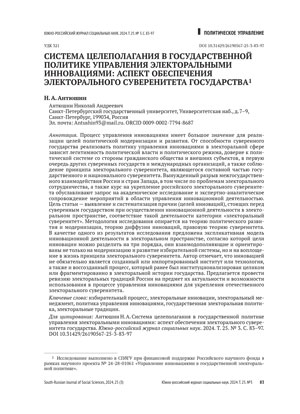Abstract
The process of innovation management is of major importance for the realization of political modernization and development goals. The ability of a sovereign State to implement the policy of managing innovations in the electoral sphere, as well as to implement the principle of electoral sovereignty, which is an integral part of state and national sovereignty, determines the legitimacy of political power and political regime, and the trust of civil society and a wide range of external actors (first and foremost, other sovereign States and international organizations) in the political system. The disruption to interstate communication between Russia and Western countries, including the issues of electoral cooperation, as well as the drive to reinforce Russia’s electoral autonomy, has led to a significant requirement for academic research and expert-analytical support in the domain of innovation management. The purpose of the article is to identify and systematize the reasons (innovation goals) that the sovereign state faces when carrying out innovation activities in the electoral space, and the conformity of such activities with the category of ‘electoral sovereignty’. The research methodology is based on the theory of political development and modernization, the theory of diffusion of innovation, and the legal theory of sovereignty. As one of the results of the study, an explicative model of innovation activity in the electoral space is proposed, according to which innovations can be divided into three orders of goals. These goals are complementary and oriented not only towards the modernization and development of the electoral system, but also towards the implementation of the principle of electoral sovereignty. The author notes that an innovation is not necessarily a newly created or imported institution or technology; rather, it can also be a recreated process that was previously institutionalized in its entirety, or fragmented, in the electoral history of a state. The author suggests reformulating Russia’s electoral traditions to make them relevant and innovative. This would strengthen the domestic electoral sovereignty.
Keywords
Funding information
The study was carried out at St. Petersburg State University with the financial support of the Russian Science Foundation within the framework of scientific project No. 24-28-01061 “Innovation Management in State Electoral Policy”
References
Баранов, Н.А. (2021). Выборы как институт доверия особенности функционирования в условиях пандемии COVID‑19. Управленческое консультирование, 10, 10–21. DOI: 10.22394/1726-1139-2021-10-10-21
Борисов, И.Б. (2024). Обеспечение электорального суверенитета во внешних отношениях. Гражданин. Выборы. Власть, 2(32), 88–103.
Борисов, И.Б. (2010). Электоральный суверенитет. М.: РОИИП.
Гришин, Н.В. (2019). Изучение государственной электоральной политики: как формируется исследовательская повестка дня. Политическая экспертиза: ПОЛИТЭКС, 15(2), 261–274. DOI: 10.21638/11701/spbu23.2019.207
Гришин, Н.В. (2024). Изучение инноваций государственной электоральной политики: обзор научной литературы. Вестник Пермского университета. Политология, 18(2), 149–159. DOI: 10.17072/2218-1067-2024-2-149-159
Давыдова, Н.С. (2023). Детерминанты развития инновационной политической системы: теоретические основания и практика. Государственное и муниципальное управление. Ученые записки, 2, 303–308. DOI: 10.22394/2079-1690-2023-1-2-303-308
Елисеева, Г.В. (2022). Влияние пандемии COVID‑19 на избирательные права и свободы. В С.К. Буряков (ред.) Реализация Конституции Российской Федерации: состояние и перспективы. Материалы VI международной научно-практической конференции (с. 20–21). Омск.
Карпова, Н.В. (2021). Электоральная культура российского общества в фокусе парламентских выборов 2021 г. Теория и практика общественного развития, 12, 35–40.
Колюшин, Е.И. (2019). Правовые проблемы электронизации (цифровизации) выборов. Вестник Университета имени О.Е. Кутафина (МГЮА), 9, 103–113. DOI: 10.17803/2311-5998.2019.61.9.103-113
Мазур, О.Г. (2024). Эволюция электоральных политических практик в России. Известия ТулГУ. Гуманитарные науки, 1, 47–64.
Морозова, О.С. (2021). Политическая модернизация и электоральные процессы в цифровом обществе. В А.В. Соколов, А.А. Фролов (ред.) Возможности и угрозы цифрового общества. Материалы Всероссийской научно-практической конференции (сс. 179–183). Ярославль.
Осипов, М.Ю. (2021). Новеллы и инновации в праве: понятие и соотношение. Право и политика, 2. DOI: 10.7256/2454-0706.2021.2.35031
Плотников, Н.В. (2009). Социальная инновация: специфика социологического анализа категории. Вестник Российского Университета дружбы народов. Серия: социология, 4, 51–55.
Старостин, А.М., Понеделков, А.В., Тованчова, Е.Н. (2023). Инновационные аспекты в электоральной политике современной России. Наука и образование: хозяйство и экономика; предпринимательство; право и управление, 5(156), 132–137.
Трыканова, С.А. (2021). Направления развития организационно-правовых условий дистанционного голосования в России. Образование. Наука. Научные кадры, 1, 85–87. DOI: 10.24411/2073-3305-2021-1-85-87
Чимаров, Н.В. (2020). Актуальные вопросы нормативно-правового закрепления новой технологии голосования на платформе «blockchain». В В.И. Скрябин (ред.) Государство, право и общество: вопросы теории и практики. Материалы второй всероссийской научно-практической конференции. Сочи: сборник статей (с. 503–508). Ростов-на-Дону.
Шидловский, А.В., Сухопаров, В.П. (2024). Единый день голосования: новации избирательного законодательства и правовая охрана проведения выборов депутатов. Журнал Белорусского государственного университета. Право, 1, 46–51.
Шумпетер, Й.А. (2008). Теория экономического развития. Капитализм, социализм и демократия. М.: Эксмо.
Global overview of Covid‑19: Impact on Elections (2020, May 27). International IDEA. Retrieved from https://www.idea.int/data-tools/tools/global-overview-covid‑19‑impact-elections
Hong, S., Kim, S.H., Kwon, M. (2022). Determinants of Digital Innovation in the Public Sector. Government Information Quarterly, 39(4). DOI: 10.1016/j.giq.2022.101723
Riwanto, A., Suryaningsih, S., Firmandiaz, V. (2024). Preventing Electoral Fraud in Indonesia: Protecting the Social Security of Election Management Personnel. Jurnal Media Hukum, 31(1), 95–114. DOI: 10.18196/jmh.v31i1.19361


